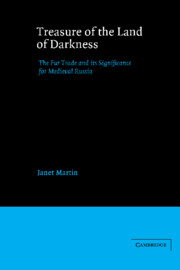Book contents
- Frontmatter
- Contents
- Maps
- To my parents
- Acknowledgements
- Note On Transliteration
- INTRODUCTION
- 1 BULGAR
- 2 THE RUS'
- 3 NOVGOROD: THE SQUIRREL FUR TRADE
- 4 MOSCOW AND KAZAN': THE LUXURY FUR TRADE
- 5 THE POLITICAL SIGNIFICANCE OF THE FUR TRADE
- 6 THE ECONOMIC SIGNIFICANCE OF THE FUR TRADE
- CONCLUSION
- Notes
- Bibliography
- Index
5 - THE POLITICAL SIGNIFICANCE OF THE FUR TRADE
Published online by Cambridge University Press: 29 October 2009
- Frontmatter
- Contents
- Maps
- To my parents
- Acknowledgements
- Note On Transliteration
- INTRODUCTION
- 1 BULGAR
- 2 THE RUS'
- 3 NOVGOROD: THE SQUIRREL FUR TRADE
- 4 MOSCOW AND KAZAN': THE LUXURY FUR TRADE
- 5 THE POLITICAL SIGNIFICANCE OF THE FUR TRADE
- 6 THE ECONOMIC SIGNIFICANCE OF THE FUR TRADE
- CONCLUSION
- Notes
- Bibliography
- Index
Summary
The preceding examination of the fur trade networks centered around Bulgar, Kievan Rus’, Novgorod, and Moscow and Kazan’ has identified the main sources, routes, and mechanisms of fur supply as well as the major markets and export routes in each network. That examination has also traced the transfer of control over these elements from one center to another. In order to determine how they occurred, the present chapter will consider the political and military episodes that were responsible for the transfers. It also provides the basis for another observation: the same episodes that resulted in the transfer of control over critical elements of the fur trade network yielded important results affecting the political ascendancy successively of Kievan Rus', Suzdalia, and Muscovy over their political and commercial rivals, Bulgar, Novgorod, and Kazan'.
Recognition of the elements of the fur trade networks and the means by which control over them was transferred lends a new dimension to the understanding of incidents associated with the territorial expansion and political consolidation of the Rus’ states. In some of the reviewed cases the commercial gains made by the challenging polity seem to be secondary results of predominantly political struggles. In other cases, however, the priorities appear to be reversed or at least merged. The purpose of this chapter is not to prove decisively that control over the fur trade, or even more broadly commercial concerns, took precedence over political objectives in the series of episodes to be reviewed.
- Type
- Chapter
- Information
- Treasure of the Land of DarknessThe Fur Trade and its Significance for Medieval Russia, pp. 110 - 150Publisher: Cambridge University PressPrint publication year: 1986



